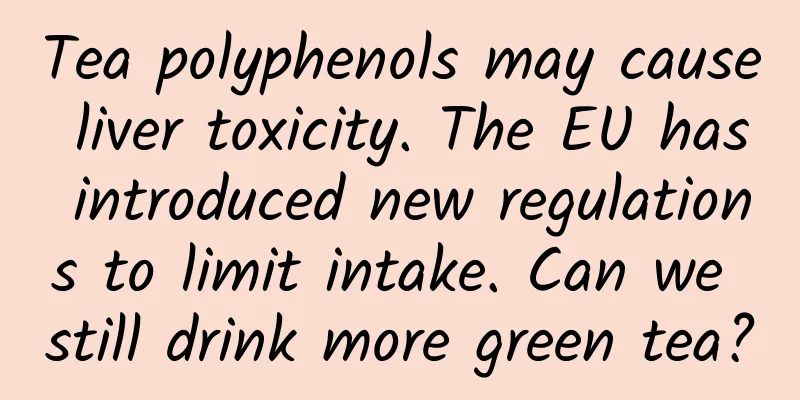Tea polyphenols may cause liver toxicity. The EU has introduced new regulations to limit intake. Can we still drink more green tea?

|
First of all, green tea is a good thing. Green tea contains a variety of active ingredients, the most important of which is tea polyphenols (GTP for short), which is a complex of polyhydroxyphenol chemicals in green tea, composed of more than 30 phenolic substances, the main component of which is catechins and their derivatives. Tea polyphenols have multiple physiological activities such as anti-oxidation, radiation protection, anti-aging, lowering blood lipids, lowering blood sugar, and inhibiting bacteria and enzymes. Based on this, green tea extract is widely used in medicine, food, and daily necessities, almost everywhere, bringing many benefits to people's lives and health. However, green tea, a substance that has been smooth sailing and widely sought after, was suddenly poured with a bucket of cold water by the European Union, saying that EGCG, the main active ingredient in green tea, is hepatotoxic and excessive intake will cause liver damage. For a time, it caused a stir in the city. Many people who have long been accustomed to drinking green tea were at a loss and trembling. Should they continue to drink it or give it up? Some people also dismissed the EU's statement, thinking that these foreigners are just troublesome and will pop up a stinky bubble from time to time. Specifically, what caused this wave was a new regulation issued by the European Commission on November 30, 2022, called (EU) 2022/2340, which amended Annex III to Regulation (EU) No. 1925/2006 of the European Parliament and of the Council, and included green tea extract containing EGCG in the list of restricted substances. The new regulations that have come into effect require that all relevant products that do not comply with the regulations will be restricted from sales starting June 21, 2023. This is the first regulation in the world to restrict the active ingredients of green tea products. Some people may think that our great country has a long history of green tea, so what does it have to do with the EU? In fact, this idea is too narrow-minded. Nowadays, the world market is very complex. This new regulation will inevitably greatly affect the future export of green tea products in my country and will also require many companies to redefine their production standards. So, does this restriction warn us to be careful when drinking green tea in the future, as drinking too much will harm our health? Let's analyze it: Green tea is rich in tea polyphenols, which account for 20-30% of the dry weight of tea leaves. The main chemical components of tea polyphenols are divided into four major categories: catechins, flavonoids, anthocyanins, and phenolic acids. Among them, catechins have the highest content, accounting for 60-80% of tea polyphenols. Among catechins, there are four substances: epicatechin, epigallocatechin, epicatechin gallic acid, and epigallocatechin gallate. Among them, epigallocatechin gallate, which is the EGCG, has the highest content, accounting for 50-80% of the total catechins, and this EGCG is the most active. Generally speaking, EGCG is the most effective ingredient in green tea for human health, accounting for about 6-20% of the dry weight of tea leaves. The new regulation (EU) 2022/2340 issued by the European Union also restricts EGCG, requiring that the EGCG content in all tea products must be controlled to less than 800 mg per day. In other words, the amount of EGCG indicated in the instructions of all tea products should be less than 800 mg per person per day. This conclusion was drawn because as early as 2015, Norway, Sweden, Denmark and other countries had proposed to the EU to include EGCG in the restricted use list due to the potential risks of consuming it. Based on this, the EU asked the European Food Safety Authority (EFSA) to conduct a safety assessment on green tea catechins. The results of various tests and evaluations by EFSA show that if the daily amount of EGCG is greater than or equal to 800 mg, it will cause an increase in serum transaminase and cause liver damage. Therefore, the new EU regulations set 800 mg as a limit and set restrictions on the EGCG content in tea products. So should we not drink green tea in the future, or be cautious every day for fear of drinking too much? In fact, we can easily know the impact of this restriction on drinking green tea by doing some calculations. According to the calculation that EGCG accounts for about 10% of the dry weight of tea leaves, 1 liang of tea leaves contains about 5 grams of EGCG, which is 5000 mg. This number looks scary. According to the upper limit of 800 mg, the EGCG in 1 liang of tea leaves can cause liver damage to 6 people. But the reality is that the EGCG content in green tea varies greatly depending on the tea variety, texture and production process, and these contents are all extracted. During the tea brewing process, these ingredients will not be completely dissolved, and depending on the water temperature, EGCG will lose its activity. Therefore, the EU and various studies have not given data on how much tea people can safely drink every day. Some people have calculated based on relevant data released by the EU that to consume 800 mg of EGCG, you need to fully consume 50 to 100 grams of dry tea leaves, or drink about 34,000 ml of brewed green tea. If a person has the habit of chewing 1 liang of dry tea leaves every day, or the habit of drinking 34,000 ml of brewed strong tea soup every day, then he should check his liver condition, as it is likely that liver damage has occurred. However, it seems that there are very few or no such people, so it is not only harmless for people to keep the habit of drinking green tea every day, but also has many benefits. It should be noted that people who like to chew dry tea leaves or drink too much strong tea all day long should exercise moderation. Of course, it is more important for people who are used to taking health supplements. If you take health supplements containing green tea extracts such as catechins or EGCG, you should read the label carefully to see if it exceeds 800 mg of EGCG per day, so as to prevent risks. In summary, the new EU regulations are mainly aimed at green tea extract products, and have little impact on our daily habit of drinking green tea. Green tea is still a good thing and everyone can drink it with confidence. As the saying goes, eat and drink as you should, but don't eat too much. Moderation is good for health. What do you think about this? Welcome to discuss. This is an original article from Space-Time Communication. Please respect the author’s copyright. Thank you for your understanding and support. |
<<: Bacteria can also point north and south?!
>>: This plant can catch insects in just 0.01 seconds
Recommend
NetEase Cloud Music Product Analysis: The Product Logic Behind the Drastic Increase in Data
NetEase Cloud Music was launched in April 2013, a...
3 aspects to analyze the art of channel operation
In the Internet environment, it is said that traf...
How can tool-type products achieve long-term user growth and retention?
How can tool products break through the dilemma o...
Five aspects to explain the innovation ceiling of smartphones
It is not a new view that Apple has lost its inno...
Nanjing Tea Studio is recommended, and friends who have been there are full of praise
Recommendations for places to taste tea in Jiangn...
Ministry of Industry and Information Technology: 2019-2020 Artificial Intelligence Industry Talent Development Report
The report believes that due to the late start of...
Born ugly, locals call it "the most terrifying animal"
What ugly animals have you seen? There is an anim...
Are the “duckbill forceps” used for gynecological examinations really “modern female torture devices”?
If you were to ask what examination is the most t...
As the trend of paid video streaming emerges, are video sites ready to let users pay for it?
Listening to music for free and watching movies o...
Can myopia be controlled while sleeping? Are the "myopia magic tool" OK glasses really OK?
“Can orthokeratology lenses really delay the prog...
TBchoi Human Body Basics Class 8th 2020 LAELAPS [Good quality with brushes]
TBchoi Human Body Basics Class 8th 2020 LAELAPS [...
No installation required, convenient and practical! WeChat web version file transfer assistant experience
A file transfer assistant that can be used with a...
Hejun's Strategic Thinking Course (Issue 24)
Hejun's Strategic Thinking Course (24th Issue...
What are the methods of QQ marketing? What are the marketing and promotion methods using Tencent QQ?
Today we are living in the Internet age, and we c...
Animals imitate humans in fighting! Has your dog ever imitated you?
Review expert: Li Weiyang, a well-known popular s...









